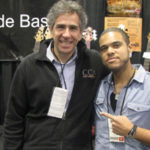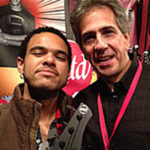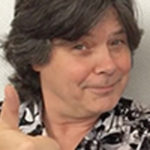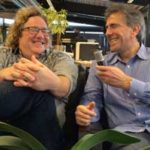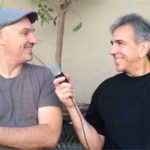Former “Tonight Show” bassist talks to FBPO about the gigs with Wynton Marsalis, Diana Krall, and Paul McCartney
Exclusive interview with FBPO’s Jon Liebman
October 21, 2013
Robert Hurst is an accomplished bassist, composer, arranger and bandleader, originally from Detroit, Michigan. Throughout his brilliant career, Robert has performed and/or recorded with Charles Lloyd, Tony Williams, Ravi Coltrane, Chris Botti and countless others, including, most recently Paul McCartney. His resume also includes longstanding gigs with Wynton Marsalis and Diana Krall, as well as an eight-year stint as bassist for The Tonight Show band, under the leadership of Wynton’s brother, Branford Marsalis.
Hurst, who also serves as an Associate Professor of Music at the University of Michigan, released his newest CD, Bob: A Palindrome, in March 2013 on own label, Bebob Records. This interview was conducted backstage at the 2013 Detroit International Jazz Festival.
FBPO: As Detroiters, we are proud to claim you as one of our own.
RH: I’m proud to be one!
FBPO: Tell us about your musical upbringing.
RH: I’d have to say, probably like every bass player from Detroit, my first influence was Motown. I remember hearing James Jamerson all the time, even before I knew who he was. When I started playing with “real” musicians around town, they all told me to keep in touch with the Detroit tradition, which was, you know, Ron Carter, Paul Chambers, Al McKibbon, Doug Watkins, Ali Jackson, all those guys. I’m happy to be part of that club.
FBPO: Like I said, we’re happy to claim you! There was a lot of great music that came out of Detroit. What was it about the bass that was special to you?
RH: I just gravitated toward it. Like that cliché: You don’t choose the bass; the bass chooses you. I remember one Christmas, I was about 6 or 7 years old, all my cousins and I got guitars and we wanted to be like the Jackson 5. I just gravitated toward the bass lines: “My Girl,” “Papa was a Rolling Stone,” on the low strings of the guitar. Eventually, I started taking bass lessons on the guitar. I broke the top two strings, so it was like a bass an octave up.
FBPO: Piccolo bass!
RH: Yeah, right! Exactly! Man, I was an innovator and I didn’t even know it. [Laughs] I took lessons on that and eventually my parents got me a bass. I’ve been at it ever since.
FBPO: You were still very young when you got the gig with Wynton Marsalis. How did that come about?
RH: I met the drummer, drummer extraordinaire, Jeff ’Tain Watts. I met him on a gig with Geri Allen and Marcus Miller in Pittsburgh when I was still in high school. We didn’t really keep in touch, but a few years later, when I was a freshman at Indiana University, Jeff called me and said they needed a bass player. I went and auditioned. I had just been in school for like a month. I got the gig, but I didn’t take it because I knew my parents would have killed me. [Laughs] So I went back and almost finished school. Around my third year, I started working with Wynton while I was still going to school, but that was not congruent, so I left and went to play with Wynton.
FBPO: When you were at Indiana, were you studying classical also, on the upright? Murray Grodner? Stuart Sankey?
RH: Stuart Sankey! You know. I actually auditioned at University of Michigan for the teacher, Lawrence Hurst – no relation. He said not to go there because, at the time, they really didn’t have a jazz program. When I went to Indiana, Edgar Meyer was there and he was amazing. He had just won the ISB competition. My parents didn’t want me to go to a conservatory. They wanted me to go to a liberal arts school, so I ended up there (Indiana) and it was a great experience.
FBPO: Tell me about playing with Wynton Marsalis.
RH: In the dictionary under “disciplined” is Wynton Marsalis. He’s an extremely hard worker and so serious about the music. I was really lucky because when I practiced, I would just play with records and he helped me really start taking what I was doing seriously. I think I met Wynton about a month after I met Edgar Meyer. Meeting those two guys at that time really inspired me to practice and really get my head in the game, as opposed to just playing what I liked. You have to play what’s necessary to build yourself as a musician.
FBPO: Jumping ahead, tell me about The Tonight Show with Branford and the whole Jay Leno thing. You did that for quite a while.
RH: I did it for eight years. I was living in New York when the call came to do it and it was hard to say no. I never really saw myself as a New York kind of guy, anyway. Branford was about to say no, but we kind of talked him into it. It was a great experience, the whole TV thing, learning about production, how to make things short and sweet and to the point, my organizational skills, presentation, everything. I learned so much. It’s related to music, but it’s not really music. It’s the things it takes to build a show. It was a great time. We had a chance to meet a lot of people.
FBPO: I remember asking you about that gig right after you got it. You said, “We play about ten minutes of music a night.” I said are you complaining? You said, “Oh, no!”
RH: [Laughing] It’s a lot more per note that you make!
FBPO: Let’s talk about Diana Krall. You’ve done a bunch of touring and some recording with her. Tell me about her – and maybe a little about Elvis Costello.
RH: That gig is great. And how it came to me is almost as good as the gig. I got a call from Ray Brown right after I left The Tonight Show. He asked if I was looking for a gig and I said, “Yeah, sure.” He said Diana Krall was looking for a bass player and he hooked me up with her management. So that’s how it came to me.
I had recorded with some singers, but I hadn’t really toured with singers. Learning that stuff helped my ability to accompany a singer. She sings and plays piano. We have a guitarist as well, so how to fit into the dynamic of doing that is very interesting. It sensitized me to other situations by listening and really paying attention to the note she’s singing as well as the voicings she’s playing on the piano. I think it has really translated into my music.
FBPO: Speaking of accompanying singers, I interviewed John Clayton at the International Society of Bassists convention recently and I asked him about his experience playing with Paul McCartney with his Kisses on the Bottom project. I know you were also heavily involved in that project. I mean Ray Brown, yeah, that’s cool, but… Paul McCartney.
RH: [Big Laugh!] Paul was so ridiculously cool. There are people that can be jerks. And some people are jerks. Paul does everything to make you comfortable. I learned so much from him and his transformation from super-mega pop star to essentially like a jazz singer. It was great seeing this process. I remember the first day we started recording, he was singing everything in a Billie Holiday voice.
FBPO: That must have been interesting.
RH: It was really interesting because he really knew about Billie Holiday. You could see at first it was really funny, but then he started really capturing the phrasing. Then he started doing it in his own voice. Seeing him go through that process was really, really cool. He was just a ball to work with, super easy, just one or two takes.
FBPO: Your latest recording is Bob: A Palindrome. Love the title. I understand that was actually recorded quite a while ago.
RH: It was.
FBPO: But it was just released recently.
RH: It was released this year. We recorded it one month after 9/11 and we did it in Brooklyn. As you can imagine, New York was just a mess. It was crazy, logistically. It’s on my own label, so it was very expensive dealing with that whole thing. In the meantime, I went on the road with Charles Lloyd and Pharoah Sanders. Then I started with Diana Krall and she’s just so crazy busy. I didn’t just want to release it while I was on the road with someone else. I actually did two other records in the meantime. I play with a lot of trios and quartets, so I did some of that music, unrehearsed. And I did kind of an electronic project, too. So things didn’t always fall exactly in order. Everything’s not always A-B-C-D-E-F-G.
FBPO: What about the future? What lies ahead for Bob Hurst?
RH: More touring. My work at the University of Michigan keeps me pretty busy, too. I’ve also been working on a project with Marcus Belgrave, a duo project, so I’ve got more writing to do.
FBPO: Trumpet and bass?
RH: Trumpet and bass and we have some guest drummers and percussionists. We already recorded some stuff with a tabla player from India.
FBPO: What would you be if you were not a bass player?
RH: I would either be the oldest player in the NBA or a chef. That’s the only thing I think I can make money at. I don’t think I could make money in the NBA!

